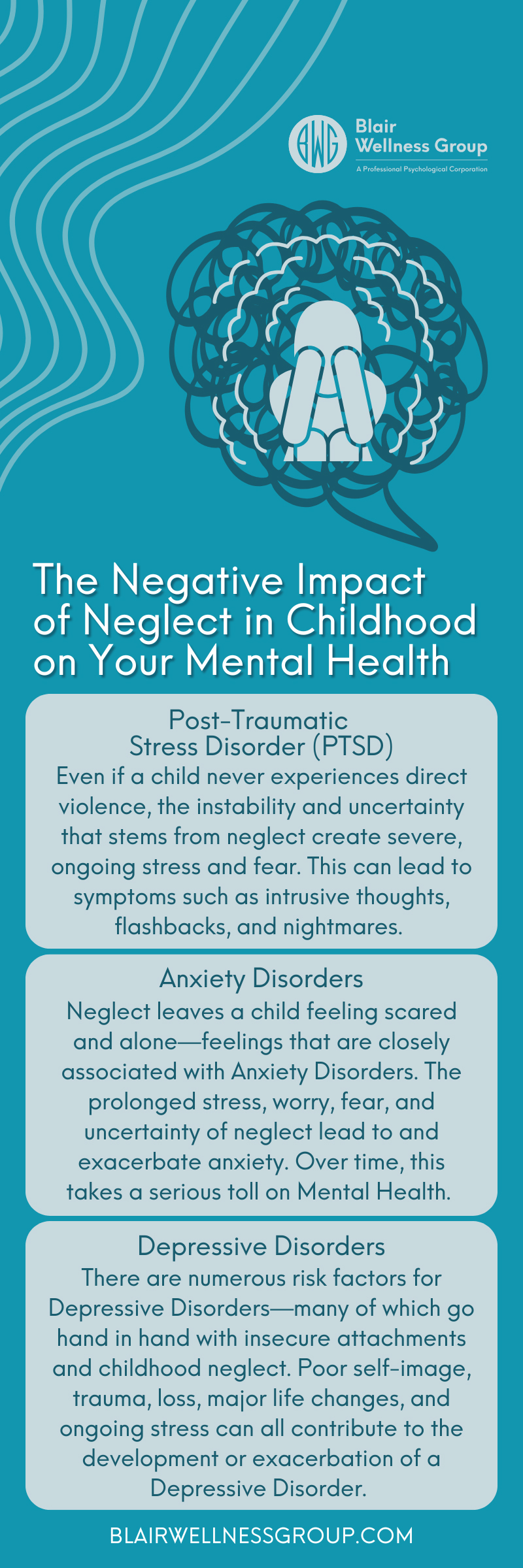The experiences you have as a child influence your life as an adult. In many ways, this is a good thing. The lessons you learn, the happy memories you make, and the dreams you have help shape who you are, creating the foundation for so many wonderful things in life. However, it can also be harmful. Negative childhood experiences have a serious impact on Mental Health—one that is hard to trace into adulthood, even as it continues to impact how you think, feel, act, react, or respond to relationships, people, and the world.
Neglect, abuse, trauma, and other adverse childhood experiences can alter the brain’s development and lead to attachment issues, inability to relate to others, or in some cases Reactive Attachment Disorder, Mental Health Disorders, and other challenges in functioning as an adult. Understanding the Mental Health impacts of neglect makes it easier to identify childhood experiences as the root cause of these Mental Health Conditions. From there, you can seek intervention and treatment based on evidence-based models under the care of a Licensed Clinical Psychologist to sift through these experiences, achieve mental health, and experience an adaptive lifestyle to be able to function in your adult life. Read on to learn more about the relationship between childhood neglect or abuse and its negative impact on your Mental Health to see how you can get treatment and the intervention you need to change your future trajectory.
Neglect vs. Abuse
Neglect and abuse often go hand in hand, but they are two separate forms of child maltreatment. Child abuse occurs when a parent or other guardian figure takes a harmful action against a child. Neglect, on the other hand, is the failure to act in a way that protects the child from harm or provides them with the relief they need in a time of distress.
Just as there are different types of abuse—including physical, verbal, and emotional—there are different types of neglect. Most people think of child neglect as physical, as is the case when a neglectful parent fails to provide adequate food, clothing, and shelter for their child. However, social, psychological, and emotional neglect also devastate a child’s Mental Health and hinders their emotional, cognitive, or psychological development. A child who does not have access to healthy meals starves physically; a child who does not have access to attention, comfort, stress relief, emotional protection, secure attachment, and psychological support starves mentally and emotionally.
Impacts on Attachment Style
Your attachment style stems from the relationship you have with parents or caregivers during infancy. In cases of neglect, that relationship is unstable and inconsistent; you learn that you cannot rely on parental figures for physical or emotional care. This creates an insecure attachment, which, in turn, influences how you view yourself, the people you meet, and the relationships you build throughout life.
Insecure attachment hinders emotional development. Individuals with attachment issues struggle with poor self-image, anger management, stress management, inability to modulate their affect, high levels of impulsivity or reactiveness, and emotional dysregulation. They also struggle with building, sustaining, nurturing, nourishing, and maintaining healthy relationships throughout adulthood. In addition to these problems, insecure attachment styles adversely affect the development of other Mental Health Conditions, such as Depressive Disorders, Anxiety Disorders, Personality Disorders, addictions, traumas in adulthood, marital discord, failure to thrive at work, and other negative consequences.
Impacts on Brain Development
Healthy brain development relies on a stable home and a strong relationship with parents or guardian figures. The absence of care, protection, and support disrupts crucial cognitive development. This hinders the creation of strong cognitive abilities and positive thought patterns. It also allows negative thought patterns to develop.
Neglect is a threat to a child’s well-being, and the human brain—even a child’s brain—is exceptionally good at detecting threats. As a result, the child’s stress response activates. This leads to excessive fear and anxiety, which affects growth and performance in key areas of the brain, such as the amygdala, hippocampus, and prefrontal cortex.
Impacts on Mental Health
Individuals who experienced childhood neglect are at greater risk of developing a Mental Health Disorder. It is not always easy to see the long-term impact of neglect, nor is it easy to identify childhood experiences as a cause of Mental Health Conditions. However, by understanding the Mental Health impacts of neglect, patients can address the issue at its source and create truly effective change in their lives.
Below are just a few examples of Mental Health Disorders that can develop or worsen because of childhood neglect.
Post-Traumatic Stress Disorder (PTSD)
Child abuse and neglect are common causes of Post-Traumatic Stress Disorder, or PTSD. Even if a child never experiences direct violence, the instability and uncertainty that stems from neglect create severe, ongoing stress and fear. This can lead to symptoms such as intrusive thoughts, flashbacks, and nightmares.
PTSD, along with issues stemming from insecure attachment, can have a negative impact on self-image, perceptions of others, and the development of relationships. It can also influence and exacerbate comorbid Mental Health Conditions such as Substance Abuse Disorders. These complications make it difficult to seek professional intervention and identify childhood neglect as the source of the problem.
Anxiety Disorders
Neglect leaves a child feeling scared and alone—feelings that are closely associated with Anxiety Disorders. The prolonged stress, worry, fear, and uncertainty of neglect lead to and exacerbate anxiety. Over time, this takes a serious toll on Mental Health.
Furthermore, many children who experience neglect might blame themselves for their problems, leading to a negative self-image that can feed into feelings of anxiety. Children might also feel they need to be perfect in order to gain attention and care. These tendencies are another risk factor for Anxiety Disorders.
Depressive Disorders
There are numerous risk factors for Depressive Disorders—many of which go hand in hand with insecure attachments and childhood neglect. Poor self-image, trauma, loss, major life changes, and ongoing stress can all contribute to the development or exacerbation of a Depressive Disorder.
Moreover, someone who struggles to maintain positive relationships due to insecure attachment will often feel isolated, which can increase their chances of developing Depressive Disorders or other Mood Disorders. Emotional dysregulation can also heighten the impact of stress, fear, loss, and other negative emotions, making you more susceptible to depression and the negative feelings it creates.
Creating Cycles of Abuse
Child maltreatment is very rarely an isolated experience. Many adults who suffered neglect as a child end up in other abusive relationships—either as the abuser or as the victim—as adults. If abuse and neglect are normalized in childhood, they feel familiar in adulthood, making those relationships easier to enter and harder to leave as an adult. Furthermore, Mental Health Disorders and feelings of fear, anger, or inadequacy can create unhealthy relationship dynamics. Abusive relationships can lead to abusive parent-child dynamics, continuing the cycle of abuse from generation to generation.
Healing From Childhood Neglect
It is never too late to break the cycle of abuse and find effective, lasting treatment for childhood neglect and the Mental Health Conditions that stem from it. If you are looking for a Licensed Clinical Psychologist who offers therapies such as Psychoanalytic Therapy in Los Angeles, Irvine, Beverly Hills, Newport Beach, Bel Air, Century City, Brentwood, Westwood, Huntington Beach, Mission Viejo, Aliso Viejo, and the surrounding areas, contact Blair Wellness Group to see how our evidence-based treatment plans can help you.

Dr. Cassidy Blair is a renowned Licensed Clinical Psychologist and trusted Performance Coach who specializes in providing Concierge-Psychological Care and Executive Coaching for high-achieving professionals. With a deep understanding of the unique challenges faced by CEOs, executives, entrepreneurs, and leaders, Dr. Blair offers tailored, confidential care designed to foster emotional well-being, personal growth, and professional excellence. Her clientele values her discretion, clinical expertise, and emotionally intelligent approach to navigating complex personal and professional dynamics.
- This author does not have any more posts.




